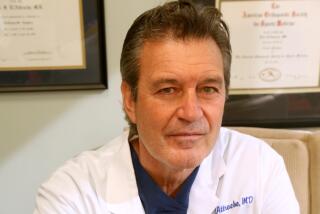Angels’ Mercker Recovers From Cerebral Hemorrhage to Pitch Again
- Share via
The second-most important event in Kent Mercker’s summer happens tonight.
Just a little more than three months after suffering a life-threatening cerebral hemorrhage, the 32-year-old left-hander will pitch for the Angels against the Yankees at Edison Field.
A special moment, but a distant second to the summer’s highlight: “I got to be at my daughter’s birthday party,” Mercker said. “Normally it’s a phone call from the road. The look on her face when mom told her that dad was going to be home, that told me what life as all about. That big smile was great.”
Madison Mercker turned 6 June 5. Mercker also has a 3-year-old daughter, Sophia.
“He led the girl scout party too,” said Julie Mercker, his wife. “He ran the balloon toss and the egg toss. He was the biggest kid out there.”
Mercker--who has said, “I defied death and lived to tell about it”--did not change his outlook on life after his 12-day hospital stay. There were no revelations, only a reemphasis of what he already knew.
“When the doctors told me what was wrong, the first thing I asked was, ‘Am I going to live?’ ” Mercker said. “The second thing was, ‘Is my life outside of baseball going to be normal? Will I be able to play catch with my kids and take them to the pool and carry them on my shoulders?’ The third thing was, ‘Will I be able to play baseball?’ ”
Mercker, who is 0-1 with a 5.16 earned-run average in 12 games this season, has reached No. 3 on the to-do list.
He rejoins a pitching staff that is short on veteran leaders. Tim Belcher is injured, Kent Bottenfield has been traded and Ken Hill was released, leaving leadership duty to Mercker, a 10-year veteran who has played with Atlanta, Cincinnati, Baltimore, Cleveland, St. Louis and Boston.
Mercker made one rehabilitation start for Class-A Lake Elsinore, retiring the 12 Rancho Cucamonga batters he faced on 52 pitches. He was to make a second rehab start with triple-A Edmonton on Wednesday, but injuries to Jarrod Washburn and Seth Etherton accelerated his return to the Angels.
“I feel I can give them 80-85 pitches,” Mercker said. “I’m not 100%, but I’m maybe 95%.”
Close enough to pitch in.
“I’ve felt useless,” said Mercker, who has a 62-59 career record. “I’ve seen guys who needed a day off. Maybe their arms were tired or hurting and I’m sitting right there thinking, ‘Man, I can’t even go in and pitch an inning for this guy and give him a night off.’ I’m was basically useless.”
Mercker seems to be the only Angel of that opinion. Two lockers away, Belcher looked over to where Mercker was sitting and shook his head.
“You get inspiration from him,” Belcher said. “We all get a little spoiled around here. We start feeling bullet proof. Then something like that happens to a guy a couple lockers down and it gives you pause. You see things can be a lot worse.”
Since his return to the team, Mercker has kept a business-as-usual attitude. For example, after throwing in the bullpen Monday, Mercker was asked by Manager Mike Scioscia how he felt.
“Pretty good,” Mercker said. Pause . . . “But I got a little headache.”
Scioscia just rolled his eyes.
“We’re both a little twisted,” Julie Mercker said. “I’m just a little calmer.”
Julie Mercker and her family were watching the Angel game May 11 from their home in Dublin, Ohio. Even before her husband doubled over in front of the mound in the second inning, she knew something was wrong.
“We’ve known each other since we were teenagers, so I know his body language,” she said. “I knew it was something else besides a sore arm. “It’s a horrible feeling to not be there when your husband is so ill. There was nothing I could do.”
Julie Mercker traveled to Orange County the next day. By then, doctors at UCI Medical Center had all but ruled out an aneurysm. What they knew for sure were the numbers:
About 80% of cerebral hemorrhages not caused by trauma are caused by aneurysms. Of those, about half the victims die. Of the patients who don’t have an aneurysm, 20% suffer deterioration and many need surgery to stop the bleeding.
Mercker beat the odds. He did not have an aneurysm and the bleeding stopped the night he suffered the hemorrhage.
“If I had known [the statistics] when it happened, I would have been a basket case,” Julie Mercker said. “That I came that close to losing him was almost too much to swallow.”
After leaving the hospital, the Merckers went home to Ohio with Kent certain that he could pitch again but also knowing that he had other priorities.
“I just relaxed,” Mercker said. “I would never want to go through that again, but I was home during a time of the year where I have been away for the last 15 years. I got to spend every day with my wife and kids. I got to do little things, like go to the pool with them in the summer.”
Said Julie Mercker: “It was nice to see what retirement is going to be like. I think every baseball wife wonders about that. It was wonderful. Not that I hope it will happen any time soon.”
Nor does Mercker. In June, a third angiogram completely ruled out an aneurysm. The blood that was trapped between his skull and brain had dissipated. Mercker began talking about returning by early August.
“It was kind of a aim-for-the-stars, settle-for-the-moon thing,” Mercker said. “I love baseball, I love it was much as you can. But I realized through this that if I get it taken away from me, I have everything I need in life.
“To know that when I walk into my home, I have a wife and two kids who don’t care how I pitched. They are just glad dad’s home.”
More to Read
Go beyond the scoreboard
Get the latest on L.A.'s teams in the daily Sports Report newsletter.
You may occasionally receive promotional content from the Los Angeles Times.







